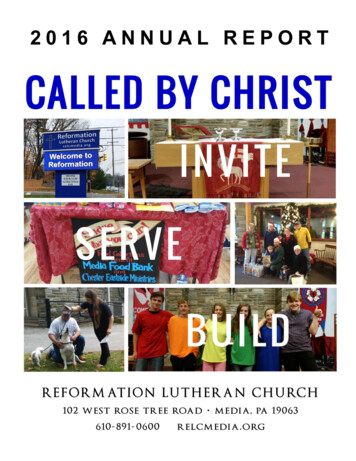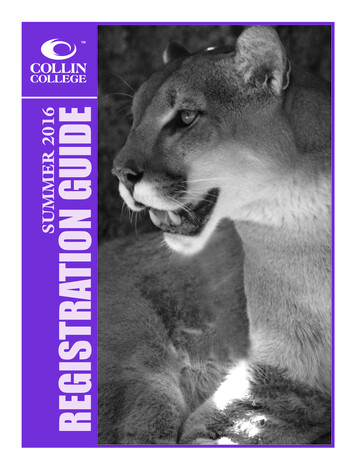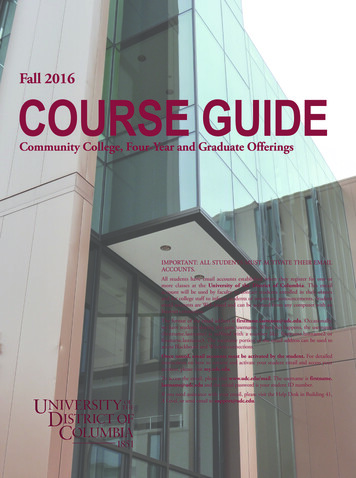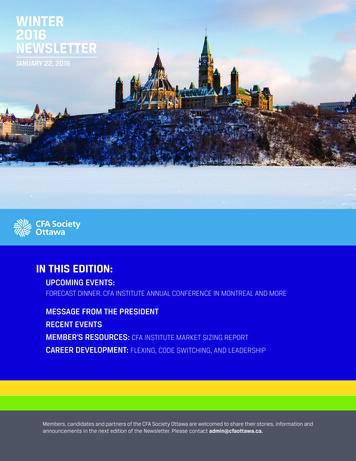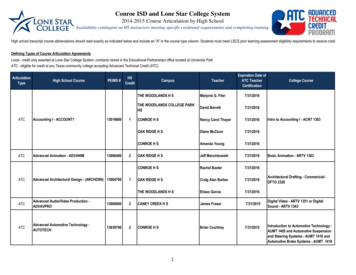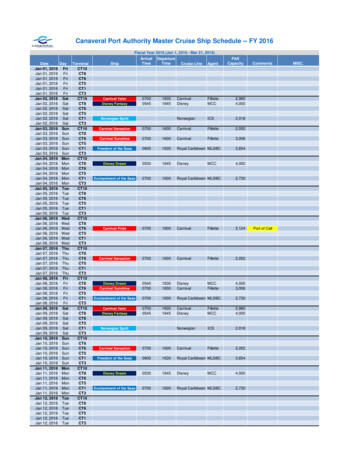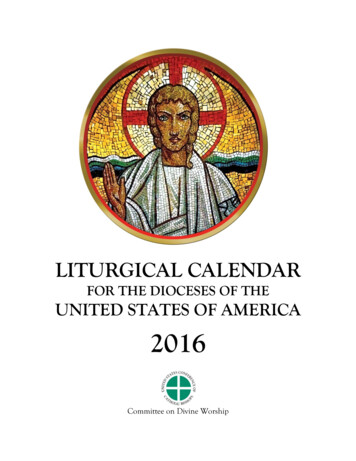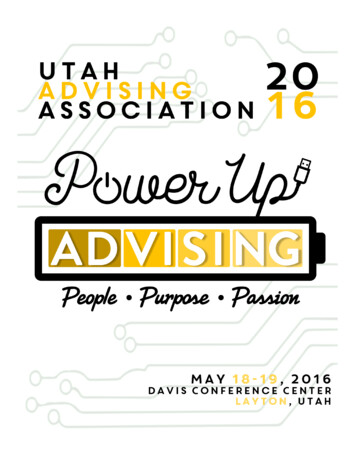
Transcription
Dear Conference Attendees:On behalf of the Utah Advising Association (UAA) Executive Committee andGoverning Board, I would like to welcome you to the 17th annual UAA conference!We are delighted that so many of you have chosen to “power up” your advising byjoining us at the Davis Conference Center in the heart of Layton. It has been mypleasure to work with the dedicated representatives from each of the 12 majorcolleges and universities in the state that comprise the Executive Committee andGoverning Board to organize this conference that we hope will aid you in yourjourney as an advisor. We look forward to meeting you and learning from youduring the next two days.Our theme this year is “Power Up Advising: People, Purpose and Passion.” With allthe roles we take on as advisors, it can be easy to find ourselves on “low powermode” as we work on our sometimes seemingly endless to-do lists. We hope thisconference will provide you an opportunity to plug in and recharge as you networkwith and learn from your colleagues across the state. We hope you will leave thisconference energized and equipped with ideas and strategies that you can put intopractice to help achieve your goals as an advisor and to help your students attaintheir educational dreams.I would like to extend a big thank you to all those who submitted presentationproposals and to those who nominated one or more of their colleagues for the 3rdannual Utah Advisor of the Year. I am also very appreciative of the presenters whospent many hours preparing to teach us, of the Advisor of the Year nominees whosubmitted their portfolios, of the volunteers who are our extra hands during theconference, and lastly, of all of you who took the time out of your busy schedules tobe here with us. The long-standing success of this conference is due to thededication of advisors like you who go above and beyond to elevate the status ofadvising on your campuses by continuing to learn and implement new practices tohelp students succeed.Camille GoochCamille GoochWeber State University2015-2016 Utah Advising Association PresidentPage 2
2016UAA 2016 Conference ProgramLetter from the 2015-2016 UAA President . 2History of the Utah Advising Association. 4UAA Mission Statement . 4Past and Present Presidents of UAA. 4UAA 2015-2016 Governing Board . 5UAA 2016 Conference at a Glance . 6Program ScheduleDay 1 Keynote Speaker Biography (Steve Smith). 11Session 1. 13Session 2 . 14Session 3 . 14Session 4 . 15Session 5 . 16Day 2 Keynote Speaker Biography (Adrienne Andrews) . 19Session 1.20Session 2 . 21Session 3 . 22Notes. 23Venue Map. 28Page 3
History of the Utah Advising AssociationThe Utah Advising Association traces its origin back more than 30 years to what was knownas the Utah Advising Conference. In the beginning, there were several advising administratorsthroughout the state that thought it would be nice to gather the advisors together from theirinstitutions for a conference to discuss advising-related issues and network with each other.Over time, this informal conference grew to include new student orientation and became agreat tradition among Utah advising and orientation professionals who looked forward to gatheringeach year in Park City at the Yarrow Hotel. As the number of advisors grew throughout Utah and asnearly all of the original conference organizers had moved on, it became clear that something mustbe done to maintain this great tradition.On September 30, 1999, those serving on the conference committee voted to officiallyorganize the Utah Advising and Orientation Association (UAOA) and a set of bylaws were adoptedthat would ensure that the opportunities for advisors in Utah would continue. Due to evolvingstructures among the majority of Utah higher education institutions, the UAOA governingcommittee voted on September 27, 2013, to remove Orientation from the name of the organization tomore accurately reflect those who participate. Advising in Utah has never been stronger, and it isthrough the strength and organization of the Utah Advising Association (UAA) that Utah has notonly maintained a valuable advising tradition, but has also hosted acclaimed regional and nationalconferences for the National Academic Advising Association.The key to success for the UAA has always been in the wonderful advisors located at theColleges and Universities throughout the state. The knowledge and experience shared among thesecolleagues has truly been amazing and is sure to continue indefinitely as we gather together eachyear.MissionThe mission of the Utah Advising Association (UAA) is to provide professional developmentopportunities for college and university personnel who serve as a part of the academic advisingcommunity. The UAA also serves as a vehicle to promote collaboration between representatives ofinstitutions throughout the state of Utah.Past & Present Presidents of the UAA2015-2016—Camille Gooch, Weber State University2014-2015—Katya Konkle, Southern Utah University2013-2014—Gale Larson, Brigham Young University2012-2013—Vicky Larsen, Utah State University2011-2012—Jennifer Wright, Weber State University2010-2011—Clint Moser, Utah Valley University2009-2010—Shanny Wilson, College of Eastern Utah2008-2009—Tyler Morgan, LDS Business College2007-2008—NACADA Region 10 Conference—Noelani Porter (Chair), Brigham Young University2006-2007—Blaine Edwards, Southern Utah University2005-2006—Lee Hinckley, Utah Valley University2004-2005—Sandy McLelland, University of Utah2003-2004—NACADA Region 10 Conference—Debra Bryant (Chair), Dixie State College2002-2003—NACADA National Conference—John Mortensen (Chair), Utah State University2001-2002—Sharon Aiken-Wisniewski, Weber State University2000-2001—John Mortensen, Utah State University1999-2000—Wade Oliver, Salt Lake Community CollegePage 4
2016UAA 2015-2016 Governing BoardPresidentCamille GoochWeber State UniversityAssistant Director, Student Success CenterPresident ElectMayumi KasaiUniversity of UtahDirector, Preprofessional AdvisingPast PresidentKatya KonkleSouthern Utah UniversityStudent Success Advisor, College of Humanities and Social SciencesSecretary (non-voting)Lonnie LujanWeber State UniversityEnrollment Director, Master of Science in Radiologic SciencesUVU Administrative Representative (non-voting)Clint MoserUtah Valley UniversityAdvisement Technology er@uvu.eduBoard MembersCara WileyBrigham Young UniversitySupervisor, Nursing Advisement Centercara wiley@suu.eduMike OlsonDixie State UniversityDirector, Academic Advisementolson@dixie.eduLori RansomLDS Business CollegeDirector of Advising and Student Successlransom@ldsbc.eduMichelle TuitupouSalt Lake Community CollegeAcademic & Career Advisor 3—Lead Career Advisormichelle.tuitupou@slcc.eduJeanne TrippStudent Success Advisorjeanne.tripp@snow.eduSnow CollegeVicky LarsenUtah State UniversityRegional Campus Advising Coordinatorvicky.larsen@usu.eduGypsie EverettAcademic Advisorgypsie.everett@usu.eduUtah State University EasternWendy FarnsworthUtah Valley UniversityAcademic Advisor, UVU Culinary Arts Institutefarnswwe@uvu.eduKaren HicksWestminster CollegeCoordinator of Disability Serviceskhicks@westminstercollege.eduPage 5
TUESDAY, MAY 17, 20167—9 PM: Registration & Check-In (Main Entrance Lobby)WEDNESDAY, MAY 18, 20167 AM—4 PM: Registration & Check-In (Main Entrance Lobby)7—8:15 AM: Breakfast in the Stratus Ballroom8:20—8:30: Welcome & Announcements: Camille Gooch, 2016 President (Stratus Ballroom)8:30—9:25 AM: Keynote Address: Steve Smith (Stratus Ballroom)SESSION ONE (9:40—10:30 AM)PRESENTER(S)SCHOOLTITLEROOMCODESPamela GeorgeBenjamin GeorgeUSUDesigning Advising for Non-Traditional Students:New Research that Will Add Power to Your AdvisingMeridianAEFB, MKim WrightPolly CalusonTracey WilsonUVUAre You Prepared for the Unexpected?MeridianDHPShelly NicholsonJennifer WozabU of UDiversity Training at UC: How We Progress TogetherMeridianCGBJulie PreeceScott HosfordRon ChapmanMelanie BurtonBYUAngry, Frustrated, and in Your Office! Best Practicesin Advising the Student Who Is Not HappyMeridianBBROOMCODESSESSION TWO (10:40—11:30 AM)PRESENTER(S)SCHOOLCameron VakilianU of UTITLETrello for My Fellow Advisors: Technology for TimeManagementMeridianAEFB, P, IShalece NuttallUVUFinding Your Purpose and Passion for the People YouAdviseMeridianDHP, IVerl LongPhilip AnosikeSLCCAdvising Strategies for Helping ESL/ELL Students’Transition from Developmental English Classes toCollege CoursesMeridianCGT, MMatt GreeneAmy SotoAnna HeierBYUHarnessing Your Passion: Motivational Planning forProductivityMeridianBPBest PracticesTheory-basedPersonal DevelopmentPage 6Advising ModelsInteractive
2016SESSION THREE (11:40 AM—12:30 PM)PRESENTER(S)Amy ElfordEmily McCoyMarleyLisa WilliamsonKaren DeysherKris Tina CarlstonMarilyn HoffmanRyan BraegerSCHOOLU of UUVUBYUU of UUSUTITLEROOMCODESWhat’s Next? Creating Effective Partnerships BetweenAcademic Advisors and Career ServicesMeridianAEFBAdvisors as Allies: High-Impact Practices for GenderConfirming Advising for LGBTQ StudentsMeridianDHB, T, P,M, IPowering Up or Powering Down? The Status of theLegal Job Market and What You Should Know forInterested Prelaw StudentsMeridianCGBWanderlust: An Introduction to Advising Conferencesand Global Advising PhilosophyMeridianBPLUNCH & DOOR PRIZES (12:30—2 PM) @ STRATUS BALLROOMSESSION FOUR (2—2:50 PM)PRESENTER(S)SCHOOLLiz LeckieDee-Dee DarbyDuffinSamantha DavisU of UJulie PreeceScott HosfordRon ChapmanMelanie BurtonTITLEROOMCODESAppreciative Advising in Action: A Cross-CampusChallengeMeridianAEFT, PBYUNervous? Avoidant? No Matter How Many Times YouE-mail, They Still Don’t Come In: Advising Studentswith Anxiety DisordersMeridianDHBDavid BeltMeg RadunichU of UUVUToto, I’ve Got a Feeling We’re Not in Kansas Anymore:Helping Students Transition from High School toCollegeMeridianCGB, T, MCori HodgeWSUJustifying Gen Eds: Increasing Task Value for GeneralEducation Among First-Generation College StudentsMeridianBT, MSESSION FIVE (3—3:50 PM)PRESENTER(S)Amy SotoCara WileyTamara YoungDenise BrenesVan MangusMichelle TuitupouBest PracticesSCHOOLBYUU of UDSUTITLEROOMCODESIs Perfectionism Zapping Your Students’ Energy?MeridianAEFB, ITelling Our Story: How to Use Narrative Ownership toAdvance Your CareerMeridianDHT, P, IVinyasa Yoga, Deep StretchMeridianCGP, IMeridianBP, ISLCC/UAA Writing Tips for Scholarship Applications andPresentation ProposalsTheory-basedPersonal DevelopmentPage 7Advising ModelsInteractive
THURSDAY, MAY 19, 20167 AM—4 PM: Registration & Check-In (Main Entrance Lobby)7—8:15 AM: Breakfast in the Grand Ballroom (Main Entrance )8:20—8:30: Welcome & Announcements: Camille Gooch, 2016 President (Stratus Ballroom)8:30—9:25 AM: Keynote Address: Adrienne Andrews (Stratus Ballroom)SESSION ONE (9:40—10:30 AM)PRESENTER(S)SCHOOLTITLEROOMCODESShari LindseyJoJo BeyeneEric GardnerLoren FinnDave BeltHailey NielsonU of UForging a New PathMeridianAEFB, P, MDaniel JensenWSULooking Beyond Standardized Tests in Non-CognitiveStudents: How Academic Advisors and Students CanExcel!MeridianDHTTonya JewellMichelle WilsonHeather HumphreysUSUDon’t Be Static! It’s Time to Recharge!MeridianCGB, P, IMichelle TuitupouCynthia BonsallSLCC100 Days of Career Exploration: Using Social Mediaand a SheepMeridianBB, MSponsorUsing Holistic Advising to Empower Students withAdviseStreamZephyrAdviseStreamSESSION TWO (10:40—11:30 AM)PRESENTER(S)SCHOOLTITLEROOMCODESKristian OlsenGypsie EverettJaycie MillerLiz PrettymanLyndsay ReidUSUEasternPower Up and Connect with Your Students: How toSpark Your Students’ Enthusiasm in Utilizing AdvisingServiceMeridianAEFB, ICandy HuffJuliana EspinosaSharon AikenWisniewskiU of UDeveloping Your Professional Competencies UsingYour Personal NarrativeMeridianDHB, P, INycole LarsenBYU“The Abyss Is Greater than Many People Believe”—TheChallenge of Moving from High School to College forStudents with ADHD: How We Can HelpMeridianCGB, TSonia ParkerSLCCFirst Research Then Success: A Demographic Study ofHispanic College StudentsMeridianBTBest PracticesTheory-basedPersonal DevelopmentPage 8Advising ModelsInteractive
2016SESSION THREE (11:40 AM—12:30 PM)PRESENTER(S)SCHOOLTITLEROOMCODESGale LarsonBYUPowering Up Our Advising Practices for the “NewUtah” Freshman: A Panel Discussion from YoungerReturned MissionariesMeridianAEFBPatricia PalmerSUUVeteran Students in Higher Education—History,Issues, and What’s WorkingMeridianDHB, TWarren LovelessRachel PreeceLori DrakeWSUEarly College—Early Retention: An Examination of TenYears of Early College in UtahMeridianCGB, P, MHe Scored 100% on the GRE, 100% on the LSAT, 99%on the GMAT: Come See How a Test-Taking ExpertDemystifies Graduate Test ExamsMeridianBNUAMESOlympus Test PrepSponsorLUNCH, ADVISOR OF THE YEAR, DOOR PRIZES,& CLOSING REMARKS (12:30—2 PM)@ STRATUS BALLROOMBest PracticesTheory-basedPersonal DevelopmentPage 9Advising ModelsInteractive
Wednesday, May 182016Keynote Speaker: Steve SmithSteve Smith is the director of the Counseling and Career Center at BYU-Provo, aposition he has held for five years. For 12 years Steve held a joint appointment with thecounseling center and the counseling psychology Ph.D. program at BYU where heserved as training director for two years. Steve has been a clinical faculty member atBYU for 24 years. Prior his time at BYU, Steve was a staff psychologist at the Universityof Utah Counseling Center.Steve received his Ph.D. in Counseling and Student Personnel Psychology fromthe University of Minnesota and did his predoctoral internship at the University ofMinnesota Counseling Center. He holds an M.Ed. in Counseling and Guidance and aB.S. in Special Education from BYU.For 16 years Steve conducted research on the school-to-work and high school-to-college transitions of American Indians. He continues to do research in this area astime allows. He taught theories of career development, group psychotherapy,psychotherapy therapy, and practicum classes to masters and doctoral students at BYUand the University of Utah. He currently conducts the spirituality in psychotherapyseminar for pre-doctoral interns at the BYU Counseling Center.Steve and his wife Klyss have been married for 35 years and have three childrenand four grandchildren. His greatest accomplishment is that he can still make Klysslaugh.Page 11
2016Wednesday, May 18Day OneWelcome (Camille Gooch) and Keynote (Steve Smith) (8:20-9:25)Diversity Training at UC: How WeProgress TogetherBreakout Session 19:40–10:30 AMShelley Nicholson & Jen WozabUniversity of UtahMeridian CGDesigning Advising for Non-TraditionalStudents: New Research that Will AddPower to Your AdvisingPamela George & Benjamin GeorgeUtah State UniversityMeridian AEFNon-traditional students are enrolling inhigher education in increasing numbers, bringingwith them a new set of challenges for advisorsand faculty (Bowl, 2001; Gilardi, S., &Guglielmetti, C., 2011). A recent study on nontraditional students in design education foundthat their values and attitudes run contrary tosome of the foundational principles of designeducation, namely the design studio, and thisconflict in values can lead to friction with faculty(George & Bussiere, 2015). Many of the findingsof this research are applicable to non-traditionalstudents across higher education. Come learnhow advisors can play a critical role in helpingnon-traditional students to navigate theirexperience in higher education and how advisorscan be an advocate for non-traditional studentsby helping to educate faculty on the needs, values,and potential contributions of non-traditionalstudents.Are You Prepared for the Unexpected?Kim Wright, Polly Clauson, & Tracey WilsonUtah Valley UniversityMeridian DHAre you prepared for the unexpected?Imagine the following scenario. You are at workand all of a sudden you find yourself in themiddle of a powerful earthquake. Your building isdamaged, but thankfully you and your co-workersare uninjured. However, your car and the roadsare damaged beyond repair. You now have to gethome on foot after this major emergency. Do youknow how far would you have to walk to get hometo reach your family? Would you be able to makeit home safely with the equipment you have onyour person right now? This session will includean overview of what a Get-Home Bag is, theimportance of having one in the office and walkparticipants through the process of creating one.Best PracticesTheory-basedIn Fall 2015, the University College (UC)Social Justice, Diversity, and Inclusion Committee (SJDVINC) was created at the University ofUtah. The goals of the committee are to train,educate, and provide opportunities ofprofessional development to staff in issuesregarding social justice, diversity, and inclusion.Our training uses the modules of the U of UStudent Affairs Diversity Committee certification,and caters it to the needs and goals of the UCstaff. In order to optimize training efforts, theSJDVINC built a strong foundation, starting withidentity formation, followed by more in-depthtopics of white privilege, microaggressions,anti-bias training, ally building, and other issuesof underrepresented populations. We havecompleted two training modules, one reading,and one written reflection. In this presentation,we will share the background and progress of UCdiversity trainings.Angry, Frustrated, and in Your Office! –Best Practices in Advising the StudentWho Is Not HappyJulie Preece, Scott D. Hosford, Ron K. Chapman, &Melanie BurtonBrigham Young UniversityMeridian BWe have all worked with a student who isfrustrated and angry. In their 2014 survey, theAmerican College Health Assessment reportedthat in a 12-month period, over 37% of collegestudents said they had felt overwhelming anger.Sometimes this can be a challenge for us. Howcan we help defuse the anger and frustration?How can we, as advisors, stay safe? Thisworkshop will discuss and demonstrate bestpractices when advising a student who is openlyangry (either via e-mail or in person). We willalso discuss and suggest possible plans to keep anadvisor safe when feeling threatened in your ownoffice.Personal DevelopmentPage 13Advising ModelsInteractive
Wednesday, May 18Breakout Session 210:40–11:30 AMTrello for My Fellow Advisors: Technologyfor Time ManagementCameron VakilianUniversity of UtahMeridian AEFDo you find yourself balancing manypriorities as an advisor? Do you wear multiplehats such as counselor, programmer, and/orinstructor and need help organizing theseresponsibilities in a better way? Technology canbe your friend in this case. This interactivepresentation will walk participants through afree, easy to use, online application called Trelloto manage your day-to-day tasks. Withtechnology now added as a professionalcompetency in Student Affairs practice (ACPA &NASPA, 2015), this session will explore ways thatTrello can organize your work life and add to yourcollection of digital strategies for success.Finding your Purpose and Passion for thePeople you AdviseShalece NuttallUtah Valley UniversityMeridian DHDo you ever look back to your first day ofadvising? Do you remember the excitement youhad when meeting with that first student, and allthe great things that you wanted to accomplish?Do you ever wonder where that “new” advisorwent and how to bring them back? In thisinteractive session advisors will have theopportunity to turn back the clock and look intohow they started advising, what changed alongthe way of their career, and how they can recreatetheir individual Purpose and Passion for thePeople they advise.Advising Strategies for Helping ESL/ELLStudents’ Transition from DevelopmentalEnglish Classes to College CoursesVerl Long & Philip AnosikeSalt Lake Community CollegeMeridian CGStudents who are English as a Second/Language Learners (ESL/ELL) are often facedwith challenges beyond learning English toadvance toward beginning college coursework.These challenges may include limited formaleducation, being a refugee or new immigrant, lowBest PracticesTheory-basedsocio-economic status, and unfamiliarity withU.S. education systems. Advising theory andmodels will be presented and explored foradvisors to develop strategies when advisingESL/ELL students to help them prepare for andaspire to obtain a college education.Harnessing your Passion: MotivationalPlanning for ProductivityMatt Greene, Amy Soto, & Anna HeierBrigham Young UniversityMeridian BAs an advisor, helping students is thepurpose and passion behind what you do. Likemany advisors, in addition to your work withstudents, you have other responsibilities that youmust attend to during the workday, leaving a loton your plate. Having a vision of your purpose asan advisor can aid you in productively harnessingyour time and energy throughout the day to reallygive to those that need it most – your students.In this session, you will learn how goal setting,effective planning, and motivation techniques canhelp you to stay focused despite the constant flowof appointments, phone calls, emails, and otherresponsibilities.Breakout Session 311:40 AM– 12:30 PMWhat's Next? Creating EffectivePartnerships Between Academic Advisors& Career ServicesAmy Elford & Emily McCoy MarleyUniversity of UtahMeridian AEFStudents often need support when tryingto make connections between their academicpaths and career options after graduation. Theytend to be easily overwhelmed by the transitionbetween their undergraduate careers and theirprofessional careers. How can we best assiststudents in this situation? What can we do toincrease their level of enthusiasm andpreparedness? In our session we will addressthe following:1. Discuss opportunities for partnerships acrosslarge campus communities that supportstudent success2. Examine four specific ways in which CareerServices and International & Area Studies atthe University of Utah are partnering to helpPersonal DevelopmentPage 14Advising ModelsInteractive
2016Wednesday, May 18ensure student success after graduation3. Address how these programs are beingevaluated and assessed for the purposes ofquantifying the success of these programsAdvisors as Allies: High-Impact Practicesfor Gender Confirming Advising forLGBTQ StudentsLisa Williamson & Karen DeysherUtah Valley UniversityMeridian DHEfforts to create and foster campusenvironments that are safe and inclusive forpeople of all sexual and gender identitiescontinues to be at the forefront of HigherEducation, yet gender non-conforming studentscontinue to report incidents of marginalizationfrom faculty, staff and peers (Pryor, 2015).Creating an LGBTQ affirming advising practicepresents many challenges and opportunities. Inthis session, participants will learn appropriategender confirming language, new ways ofthinking about gender and gender expression,explore common issues faced by LGBTQ identified individuals, and use high-impactpractices which support the academic, social andpersonal success of LGBTQ students.Powering Up or Powering Down?The Status of the Legal Job Market andWhat You Should Know for InterestedPrelaw StudentsBest PracticesTheory-basedBreakout Session 42:00–2:50 PMLiz Leckie, Samantha Davis, & Dee-Dee Darby-DuffinUniversity of UtahMeridian AEFIs the job market for attorneys that bad?Is it ever going to get better? What about thosejobs that start at 160k/year or those lawyers thatcan’t pay back their student loans? Usingstatistics and information provided by theNational Association of Law Placement thispresentation will focus on educating advisors onthe state of the legal market. It will dispel somemyths that have propagated throughout the pressand provide you with confidence to help thosestudents know when their future student loansmay be worth it and when they may not.Ryan BraegerUtah State UniversityMeridian BLunch, Door Prizes, & Break12:30–1:35 PMAppreciative Advising in Action:A Cross-campus ChallengeKris Tina Carlston, Brigham Young UniversityMarilyn Hoffman, University of UtahMeridian CGWanderlust: An Introduction to AdvisingConferences and Global AdvisingPhilosophyExotic locations, unique advisingperspectives, and a global audience; for advisorsinterested in contributing new ideas, methods,and practices to the field of advising, attending aNACADA sponsored conference can serve as acrucial stepping stone toward original and lastingcontributions to the field of advising. Thepresentation will be organized around threetopics: 1) an introduction to the timeline andchecklist for submitting research proposals, 2) adiscussion of successful strategies utilized in theproposal and publication process, 3) a detailedaccount of an international conference experienceand observed differences between global advisingand Utah advising philosophies and practices.Session participants will be invited to participatein a network of support aimed at increasing thelevel of conference attendance and scholarlypublication.What does theory look like in practice?Last spring, the Appreciative Advising committeeat the University of Utah, a university-widecommittee of both academic advisors and studentaffairs’ professionals, asked this question. To findthe answer, we developed a monthly crosscampus challenge to deepen our campus’engagement with this advising theory, both as atheory and as a model in our daily practices. Inthis session, we will briefly introduce theAppreciative Advising theory and the resourceswe shared on campus. For a majority of our time,we will discuss our campus-wide AppreciativeAdvising challenge and share responses to andassessments of the challenge, highlighting bestpractices from our advising community, as well asobstacles to this challenge. Attendees will receivetools for how to adopt and implement a similarinitiative on their campuses.Personal DevelopmentPage 15Advising ModelsInteractive
Wednesday, May 18Nervous? Avoidant? No Matter How ManyTimes You E-mail, They Still Don’t ComeIn: Advising Students with AnxietyDisorders.Julie Preece, Scott D. Hosford, Ron K. Chapman, &Melanie BurtonBrigham Young UniversityMeridian DHHow do you advise a student with ananxiety disorder? With care! Anxiety disordersare the #1 reason college students seekpsychological treatment. According to theAmerican College Health Association, in 2015,over 23% of US college students reported thatanxiety impacted their academic performance incollege. In this interactive session, come andlearn the signs and symptoms of anxiety, and howthese may impact a student’s performance in theclassroom and your office. Observe, throughvideo, an advisor interacting with a student withan anxiety disorder. Learn the possibleapproaches and academic accommodations in theoffice and classroom to help you advise studentswith anxiety disorders.Toto, I’ve Got a Feeling We’re Not inKansas Anymore: Helping StudentsTransition from High School to CollegeBreakout Session 53:00–3:50 PMIs Perfectionism Zapping Your Students’Energy?David Belt, University of UtahMeg Radunich, Utah Valley UniversityMeridian CGAmy Soto & Cara WileyBrigham Young UniversityMeridian AEFThe first year of college is filled withchange, challenges, and adjustment. Successfulstudents adapt and thrive. The new expectationsand responsibilities can be overwhelming. Cometo this session to learn about advising first-yearstudents. We will discuss theories that will help inunderstanding the mindset of freshmen students.We will cover ways advisors can help studentsassimilate into their college environment. We willexamine the differences between high school andcollege in detail. Participants will be encouragedto share their ideas and experiences with assistingstudents through a successful transition fromhigh school to college.Justifying Gen Eds: Increasing Task Valuefor General Education among FirstGeneration College StudentsCori HodgeWeber State UniversityMeridian BMany students, especially high-achievingstudents, have a tendency to exhibit perfectionistbehaviors. Perfectionist behaviors often zapstudents’ energy while attitudes of wholeness canrestore energy. What are the differences betweenperfectionism and wholeness? What are ways tohelp students re-energize? Come to this session tolearn about the differences between perfectionismand wholeness, identify thoughts, behaviors, andattitudes of perfectionism and learn how to usetools and responses for encouraging and assistingstudents in recharging their thoughts, behaviors,and attitudes to focus on wholeness. This dynamic presentation will utilize videos, demonstrations, and group discussion.Telling Our Story: How to Use NarrativeOwnership to Advance Your CareerTamara Young & Denise BrenesUniversity of UtahMeridian DHStudents in general education coursesoften wonder why universities require so manyBest Practicesclasses outside their major. Why do Englishmajors need algebra? Why do nursing majorsneed humanities? For first-generation students,these requirements may seem unfamiliar,intimidating, even
UVU Administrative Representative (non-voting) Clint Moser Utah Valley University clint.moser@uvu.edu Advisement Technology Coordinator Board Members Cara Wiley Brigham Young University cara_wiley@suu.edu Supervisor, Nursing Advisement Center Mike Olson Dixie State University olson@dixie.edu Director, Academic Advisement
